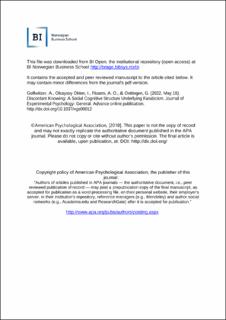Discordant knowing: A social cognitive structure underlying fanaticism
Peer reviewed, Journal article
Accepted version
Permanent lenke
https://hdl.handle.net/11250/3009746Utgivelsesdato
2022Metadata
Vis full innførselSamlinger
- Scientific articles [2173]
Originalversjon
Journal of Experimental Psychology: General. 2022. Journal of Experimental Psychology: General. Online First Publication, May 19, 2022. 10.1037/xge0001219Sammendrag
Examining the epistemic and social–cognitive structures underlying fanaticism, radicalization, and extremism
should shed light on how these harmful phenomena develop and can be prevented. In nine studies (N =
3,277), we examined whether discordant knowing—felt knowledge about something that one perceives as
opposed by most others—underlies fanaticism. Across multifaceted approaches, experimentally manipulating
participants’ views to fall under this framework (e.g., “I am certain about X, but most other people think X is
unknowable or wrong”) heightened indicators of fanaticism, including aggression, determined ignorance, and
wanting to join extreme groups in the service of these views. Additional analyses found that this effect occurs
via threat-based mechanisms (Studies 1–7), can be intervened on to prevent fanaticism (Study 2), is conditional on the potency of opposition (Study 3), differs from effects on extremism (Study 4), and extends to
mental representations of the self (Study 5). Generalizing these findings to real-world contexts, inducing participants with discordant knowledge about the 2020 U.S. Presidential Election and the morality of abortion
heightened fanaticism regarding these topics (Studies 6 and 7). Additionally, antivaccine fanatics and followers of a real-world fanatical religious group exhibited greater discordant knowing than nonfanatical individuals (Studies 8 and 9). Collectively, the present studies suggest that a specific epistemic structure—
discordant knowing—underlies fanaticism, and further, highlight the potential of investigating constructs like
fanaticism from an epistemic social cognitive perspective
